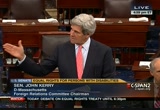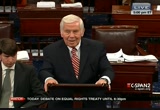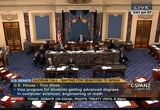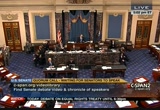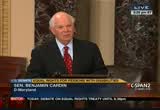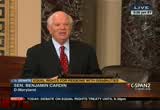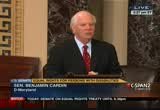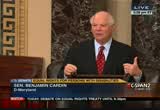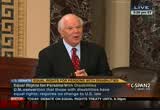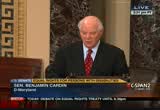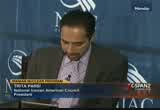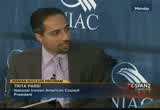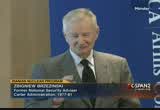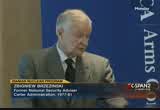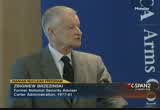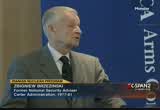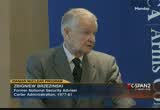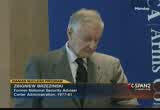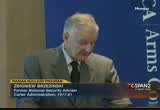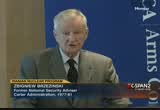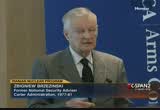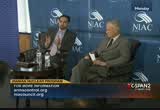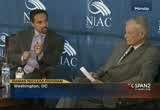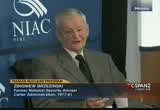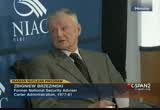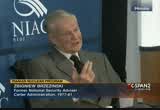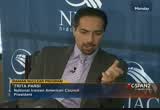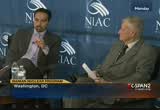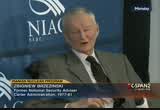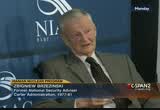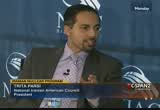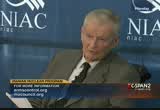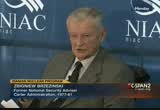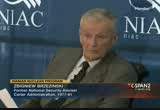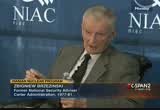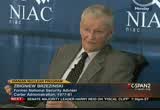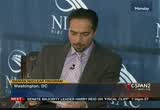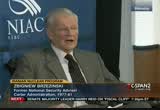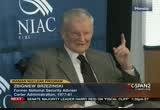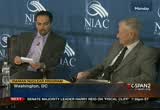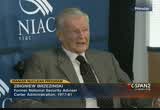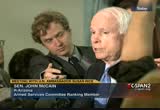tv U.S. Senate CSPAN November 27, 2012 5:00pm-8:00pm EST
5:00 pm
appropriate note of senator mccain's fervent commitment to this, and to the comments he made about former attorney general dick thornburgh. i knew the attorney general when he was attorney general, have enormous respect for him and for his career, and i think senator mccain was 100% correct when he quoted him in the record as saying nothing in this treaty will require any initiative by the united states to change a law or reduce any capacity of our courts to uphold the constitution of the united states. and i think he did an important service in his comments with respect to to that. our fight is not over, we have some work to do in the next days and i look forward to working with him on that. mr. lugar: i join the chairman in thanking john mccain for
5:01 pm
his testimony, his courage, his eloquence, his mention of those on our side of the aisle historically who have fought for the disabled. that's a very important fact today, and his presence, his strength, and determination were very inspiring. we appreciate so much his testimony. mr. kerry: mr. president, i suggest -- the presiding officer: the senator from massachusetts. mr. kerry: i suggest the absence of a quorum and ask that time be charge against both sides. the presiding officer: the clerk will call the roll. quorum call:
5:03 pm
mr. durbin: mr. president? the presiding officer: senator from illinois, the assistant leader. mr. durbin: i ask that the quorum call be suspended. officer without objection. mr. durbin: we are in the process of considering the ratification of the convention on the rights of persons with disabilities. the united states has led the world in creating the legal framework building an infrastructure and designing facilities that ensure inclusion and opportunities for those living with disabilities. this year the senate foreign relations committee under the leadership of chairman john kerry and ranking minority member richard lugar celebrateds the it 22nd anniversary of the act by reporting on the rights of persons with disabilities on a strong bipartisan basis. i want to personally thank senator kerry and senator lugar
5:04 pm
for moving the treaty through the committee process. it was -- the treaty through the committee process. it was a hectic time. they made a point of making certain that we brought this issue forward. personal thanks to my friend, senator john mccain, who's on the floor at this moment for making this a bipartisan effort. i also want to thank senators barrasso, harkin, tom udall, moran, and coons for their bipartisan support and dedication to the passage and ratification of this important treaty. now is the time for the full senate to affirm our nation's leadership on disability issues by ratifying this important treaty. and we should do so with strong, bipartisan support that has always characterized the efforts we've had on disabilities. the support 2340 for this treats strong and bipartisan. it is supported by organizations
5:05 pm
including the united states international council on disabilities, the american association of people with disabilities, the disability rights education and defense fund, and the national disability rights network. in addition, it is supported by 21 different veterans groups including the wounded warrior project, the american legion, disabled american veterans and veterans of foreign war. president george h.w. bush, who signed the americans with disabilities act into law, has called for ratification of this treaty. there's been no more passionate advocate -- and in i'm so honord that he would consider devoting his energies and good name to our effort -- for ratification of the treaty than senator bob dole, a lifelong advocate for disability rights. we need to pass this in a tribute to bob dole, for his life of service to the state of kansas and to the nation as well as his heroic efforts on behalf
5:06 pm
of the disabled in the united states senate. these people have come together to support ratification of the treaty because they know it's critical for those living with disabilities in the united states and around the world. thanks to the a.d.a. and similar larks the united states has been so successful in providing accessibility and protection of rights that our nation is already in full compliance with all terms of the treaty. before transmitting this treaty, the obama administration conducted an exhaust i have comparison of the treaty's requirements to current united states law. here's what they found: the united states does not need to pass any new laws or regulations in order to fully meet the terms of the treaty. the fact that we've already met our exceed the treaty' treaty's requirements is a testament to our nation's commitment to equality for the disabled. but ther there are still importt
5:07 pm
reasons for ratification. the veterans all over the united states travel all over the world obvious with their families. raratifying this treaty will hep move forward the day where wherever they travel they will be treated with the kind of respect that every person would expect to have in traveling around the world. ratifying this treaty will also give the united states a seat at an international table that we currently can't okay pievment the united states can sit at the table on disability rights worldwide and provide guidance and expertise based on our experience and leadership. it just stands out like a sore thumb that our country hasn't ratified this treaty when over 120 other nations have. this treaty would also level the playing field for american businesses who have investorred time and responsors to comply with the a.d.a. businesses in some countries are not required to comply with
5:08 pm
5:09 pm
house of rep in just a few weeks. that kind of techmology is developed for our veterans, as it should be. and ultimately it will be available to everyone across the united states around around the world -- and around the world as companies make this new technology so that amputees will have a full life. this technology becomes part of the export of the united states, so there are opportunities here for the united states, as other countries develop new process ps and other things for the disabled, for us to have some business opportunities with new and good ideas. american businesses will be able to export their expertise and their products in new markets, serving the hundreds of millions of people living with disabilities around the world. let me tell you why it's important for us, even though
5:10 pm
our standard are good and high in helping the disabled, to worry about those with disabilities in other countries. there are estimates that 10% of the world's population lives with disabilities. not only these people courageously live each day, they live with many challenges and hurdles that could be removed with the rights and -- with the right laws and policies that are contained in this convention. it's hard to believe but 90% of children with disabilities in developing countries never attend school. less than 25% of the countries in the united nations have passed laws to even prohibit discrimination on the basis of disability. studies indicate that women and girls in developing countries are more likely than men to have a disability. unemployment is dramatically higher for hose living in country -- for those living in countries with disabilities. this treaty will help provide the framework so countries around the world can help their own citizens with disabilities
5:11 pm
live productive, healthy lives. just like we did by enacting the a.d.a. 22 years ago, ratifying this treaty will send the world a message that meme with disabilities deavoring -- that people with disabilities deserve a level playing field. while it will ensure exclusion and access for those living with disabilities, it is also important note what the treaty will not come to the treaty will not require the united states to appropriate any new funding for resources to comply with its terms. not a single dollar. beavethe treaty will not changey law or compromise u.s. sovereignty. it will not lead to any new lawsuits because its terms do not create any new rights and it cannot be enforced in any united states court.
5:12 pm
for families that choose to educate their children at home, the treaty will not change any of the current rights and obligations under american law. i was pleased that in -- leading pro-life groups like the national write to life committee confirm that the treaty does not promote, expand access, or create any right to an abortion. when we tried to move in treaty earlier this year, some objected on the basis that the senate really shouldn't ratify a treaty during a lame-duck session. well, we did a little study. i want to moat for the record that since 1970 in the last 42 year, the senate has ratified at least 19 treaties during lame-duck sessions. there's no procedural justification for not ratifying this treaty that could mean so much to those living with disabilities. thanks to decades of bipartisan cooperation, our country embodies the worldwide gold standard for those living with disabilities. in closing, i want to again
5:13 pm
salute senator bob dole. he's been on the phone, he's working it, and i hope in tribute to his senate career that we will ratify this treaty. i also want to salute a former colleague of mine from the u.s. house of representatives, tony cohe will low. tony has been just an amazing advocate for the disabled throughout his public career in the house and ever since. he came to me and asked me if i could help in this effort, and i was happy to say "yes" to tony. i want to add one other person, marca bristow. the leading disability advocate in the city of chicago. this wonderful young woman was tireless in her wheelchair wheeling from office to office begging members and their staffs to consider voting for this. if and when we pass this, i am going to remember marca, tony and certainly senator dole for all their work. when the senate ratifies the
5:14 pm
5:24 pm
a senator: mr. president? the presiding officer: the senator from maryland. mr. cardin: i ask unanimous consent that the quorum call be dispensed with. the presiding officer: without objection. mr. cardin: mr. president, i take this time to urge my colleagues to vote for the ratification of the convention of the rights of persons with disabilities. i have the honor of serving on the senate foreign relations committee and was present during the hearings that we had in regards to the ratification of this treaty, listened to the
5:25 pm
witnesses that testified, listened to all of the arguments that have always been made about treaties, and i must tell you it was overwhelmingly supportive of the ratification of the treaty. i want to acknowledge the work of senator lugar who is on the floor. he has been a real champion on basic human rights issues and advancing it through treaties that the united states has taken the leadership on, and i applaud his unstinting commitment to advancing the rights of people with disabilities. i also want to acknowledge the work of our chairman, senator kerry, the work that he has done in regards to this treaty, senator harkin and many others who have been involved in the united states' participation in this treaty. to put it directly, we were responsible for this treaty moving forward because the united states has been in the leadership, protecting people with disabilities. this is a civil rights, human
5:26 pm
rights issue, the way we treat people with disabilities. and, mr. president, we know that the history of america was not always what it is today, and we know the struggles that people with disabilities have had in getting access to the services that we sometimes take for granted. i remember many years ago, i visited our state institution for children with -- with developmental disabilities, and i saw in one large room literally 100 children receiving no care at all, most of them not clothed. i knew that we could do better in this country. and today, our access to health services for people with disabilities is remarkably better. i remember when if you had a physical disability and were confined to a wheelchair, it was
5:27 pm
basically impossible to get use of public transportation. we have changed those policies in our country, recognizing that every american has the right to basic services. i remember when it was difficult for people to get public education in the traditional schools if you had disabilities. we have changed those laws in america, we changed our public accommodation laws, we have changed our employment laws. we have led the world in saying that it's a basic right, that people with disabilities have the same protections as every one of us. and i'm proud of the progress that we have made here in the united states. i was part of the congress in 0 that passed the americans with disabilities act. very proud to be part of the congress that passed that law. i remember two of our colleagues who have been in the forefront of this work, senator dole whose
5:28 pm
name has been mentioned, has been one of the great leaders in this body with providing the rights of people with disabilities, and congressman tony coelho who i served with in the other body, the house, took on a leadership position to bring to the public attention for us to do what was right for people with disabilities. the united states has provided international leadership. the year after we passed the americans with disabilities act, my colleague in the house, congressman steny hoyer, took that effort in the united states international. in 1991, in the organization for security and cooperation in europe, we passed the declaration on the rights of persons with disabilities because of the u.s. leadership. it's now known as the moscow document. we have provided international aspirations to make sure that we treat people with disabilities as we would treat anyone else. we had in america the strongest
5:29 pm
protections of any country. we have improved our laws. we have led the world in providing the right legal framework, the right policies, the right programs so that people with disabilities can gain access to all services. the ratification of this treaty is particularly important to the united states. i say that because it further demonstrates our leadership on this issue. we have added language in this treaty. we didn't have to do it because we didn't have to change any laws if we ratified this treaty. we were in full compliance. there is no need for america to take any further steps. all this treaty ratification does is reaffirm america's leadership on this issue and provides protection for our citizens internationally, and we made that very clear with amendments that we added to this treaty during the committee markup. we don't have to change any laws, yet it helps u.s. citizens
5:30 pm
abroad. the rights are not able to end at our border. they should have the same protections when they travel to another country or when they work in another country or when they temporarily live in another country. we want to make sure that american citizens are treated fairly. we had a witness, mr. president, who testified at a hearing on the ratification of our treaty about how she was in a wheelchair in another country. she was not permitted to use her wheelchair to get access to an airplane. that's wrong. and this treaty will protect an american who happens to be in another country, who happens to have a disability to make sure that person can get reasonable access to transportation, reasonable access to public accommodations, that that person is not discriminated against because of her or his disability. this helps advance the basic human rights globally of people
5:31 pm
with disabilities. other countries will learn from the united states. until we ratify, we can't participate in the international discussions that are taking place to protect people with disabilities. yet, we have the most advanced laws. by our ratification of this treaty, we're in a position to help other countries advance the rights of people with disabilities, and that's exactly what we should be doing in america. our nation was founded on the principles that we are all created equal, and each of us has the right to life, liberty and the pursuit of happiness, regardless of our abilities. ratifying this treaty is a strong act of diplomacy and a symbol of america's continued commitment to equal justice for all. the history of our nation has been the continued expansion of rights, opportunities, and responsibilities to more and more americans. it is in our interest and the interest of all humankind to see that the expansion happens in other countries too.
5:32 pm
i urge my senate colleagues to vote for the ratification of this treaty. it's the right thing to do for the united states. it's the right thing to do standing up for basic human rights. it's the right thing to do to protect our citizens when they travel internationally. i urge my colleagues to vote for ratification. and with that, mr. president, i would suggest the absence of a quorum. the presiding officer: the clerk will call the roll. quorum call:
6:03 pm
the presiding officer: the senator from rhode island. mr. whitehouse: i ask first that the pending quorum call be lifted. the presiding officer: without objection. mr. whitehouse: i also ask unanimous consent to speak as if in morning business for as much time as i may consume. the presiding officer: without objection. mr. whitehouse: thank you. i wanted to address two things. the first is that we are having
6:04 pm
a continuing discussion about the budget of our country and about the taxes of our country, and indeed, about the unfair and often upside down nature of our tax code that allows people making hundreds of millions of dollars a year to pay a lower tax rate than a family that earns $100 a year -- $100,000 a year. and in the context of that discussion there is one thing i think we can do right now that would be important and helpful to the vast majority of americans, indeed to 98% of american families and 97% of american small businesses and that is to assure them that their taxes are not going to go up on january 1. assuming we can't get to a budget agreement before january 1, then automatically all of the bush tax cuts will end, and the senate has actually passed a law that will allow those tax cuts to be
6:05 pm
curtailed. to be protected. for families that earn $250,000 a year and less. that bill has passed the senate and it's now over at the house awaiting action by the house. the republican-controlled house is in a position any time the speaker chooses to call up that bill and pass a guarantee of protection from tax increases that will protect 98% of american families and 97% of american small businesses and i think they should do that. it is simply awaiting their action. there is nothing more we can do in the senate. we've already passed that bill. it is one step away, speaker boehner allowing it to be called up and having it voted on from becoming law and protecting 98% of families and 97% of small businesses from tax increases january 1. there's a real likelihood we'll have to go beyond january 1 because so many of my colleagues have sworn that oath to grover
6:06 pm
norquist they won't let taxes go up and he maintains the bush tax cuts should last into eternity and anything above that would be a tax increase and violate the pledge. so we may have to wait until january 1 until the actual expiration of the bush tax cuts vitiates that base line and allows republicans to enter into the very same deal they could have before only now it's a tax decrease from the current rates that would presumably not get them in trouble with mr. norquist, versus a tax increase from i think at this point illogical and irrational tax cuts into the indefinite future. so i call on our friends in the house of representatives to pass that bill and give the vast majority of americans relief from whatever uncertainty there might be about going beyond the january 1 deadline. the second thing i wanted to
6:07 pm
address was to respond briefly to my friend from arizona, senator kyl, who spoke about the filibuster and the rules changes that are being discussed in this chamber. he spoke this morning and i had the chance to watch a good part of his remarks on the television, and i wanted to respond in a couple of ways. first of all i have the highest regard for senator kyl. we work closely together trying to get a cybersecurity compromise, we worked together years ago on the immigration compromise, i've seen him in action on this senate floor, he is very able, and when he has reached an agreement with his colleagues he is unshakeable and his word is good and i really think very highly of him although we don't agree politically on a great number of issues. but i did in an atmosphere of great respect for him wish to respond in a couple of ways. the first is that i believe at least that there's a difference between what we are considering with this rules change and the
6:08 pm
so-called nuclear option that was threatened with respect to judges. and the reason that i think that is the is that i've read the old opinions from previous presiding officers in the officers, from vice presidents in the past who have said the way the senate rules work is although we are a continuing body, the way in which the rules continue from senate to senate is that we are impliedly readopting the rules as soon as we take any business under the rules each new session. the house behaves differently. the house has new rules each session, it's an entirely new reelected body each session, and so they have to open by creating a new set of rules and adopting them and they do that at the beginning of every session. we virtually never do that. the rules continue. how is it that the rules continue? well, the ruling is they continue because they are deemed
6:09 pm
to continue as soon as the senate takes action under those rules, whatever it is. as soon as they take action under those rules at the beginning of a session, those rules are then deemed to be back in place and you don't need to readopt them. but that does mean that at the beginning of each session, there is an opportunity under the constitution to change the rules by a simple parliamentary majority of 51. i don't think that is breaking the rules to change the rules. that is part of the rules. that is how the rules actually work in the united states senate, at least that's my belief and my opinion. and given that, i think arguing that this is somehow breaking the rules or the same as the nuclear option is not quite accurate. this and the nuclear option share the similarity of allowing the senate to proceed with a simple majority.
6:10 pm
they do share that similarity. but this is different because you can only do it that one early first moment as each new senate comes into session and some could say that that's actually there as a safety valve for situations just like this, where one party is consistently, regularly, determinedly abusing a rule but because the other party can't get to 67 votes they can't change or correct the rule to restore the senate to its proper behavior. i would note that i think there's virtually nobody in this chamber that thinks the senate is operating the way a senate should. we have had literally hundreds of filibusters and they're not the old fashioned filibuster people remember from "mr. smith goes to washington" when senator smith stood at a desk probably about there in their mockup of the senate floor and talked himself exhausted reading from
6:11 pm
the baseball, reading from the constitution, he might have even read from the dictionary. i remember there was an old reporter up in the press gallery speaking about this and he talked about it being one of the great examples of american democracy, one lone senator able to speak until he's exhausted on pint that matters to him. people may have been frustrated by that kind of filibuster but there was at least a kind of noblity to it. the filibuster of today is very different. it's a threat from the minority party to bombard something with amendments so that it can't be managed on the floor. it's a threat to filibuster, to which the majority leader has to respond by filing cloture, and when the majority leader is forced to file cloture, the minority gets a benefit. they get 30 hours of debate. and, of course, as we've seen in the senate that 30 hours of debate is never used. it just consumes 30 hours of floor time. most of it spent, as the distinguishes presiding officer and i and others who preside in
6:12 pm
the senate notice, in quorum calls, in endless, deadly quorum calls with the poor old clerk having to call off the names slowly, slowly, slowly, and quietly in the chamber and nothing going on and people who are looking at this on c-span and who dial into the senate very often see that nothing going on. well, that nothing going on is usually the hallmark of the modern filibuster. it is a colossal waste of time. it is intended to be a colossal waste of time because if you do that hundreds of times as our minority has, multiply those hundreds of filibusters by 30 hours each, and you have ruined thousands of hours of senate floor time. and that disables this institution and it puts the majority under immense pressure to do the basic business of passing appropriations bills, the very simple operations of government. very often we hear our
6:13 pm
colleagues on the other side criticize we haven't passed those. well, those are complaints that are made with real crocodile tears. because it is the consistent, relentless filibuster that puts the senate in the position where it doesn't have floor time to do that work. so i think first of all, that would what we are proposing is slightly different than the nuclear option even though it shares that characteristic of getting the 51 votes that it is unique to the rule function of the senate, that it happens just that once, and that one could argue it is a safety valve that protects against situations like this. my second point is that this is really not a good situation for the senate. we waste immense amounts of time, the filibuster is used constantly, it used to be that senators filibustered bills they oppose, now the minority filibusters everything. how often have we had the experience something is
6:14 pm
filibustered and we finally break the filibuster and when we get to the vote on the actual merits of the bill, it passes with 95 or 98 senators supporting it. well, what do you conclude if you filibuster something that 98% of senators are going to support when it finally gets to the floor? you can only conclude it's being used to obstruct and delay and there's too much of that. we have too much business to be done. so i don't think there's anybody who can say that the senate is working the way that it should under the present practices. and if it takes changing a rule to change those practices, i think it will be better for everyone. i also want to point out nobody is saying there should be an end to the filibuster. what we're saying is those who want to filibuster should carry the burden of being here on the floor expressing their concerns and actually doing the filibuster. it's one of the great frustrations of those who have to defend against a filibuster that very often the members of
6:15 pm
the minority party don't even have to show up for the vote. the rule of the filibuster is that we have to get to 60 votes or it fails. whether the vote is 60-1 or 60-40 doesn't matter. so we get thrown into having to show up and vote on filibusters and the minority party doesn't even have to be here. we've heard of senators saying you know, we'll see you on -- you'll be here on monday because you've got this vote you have to take but we don't have to be here so i'm not coming back. we've had senators who have actually forced a vote a cloture themselves, go away when it came time for the vote, go home, and the rest of us had to be here to do it. at that point, the filibuster is just being used to harass colleagues and to create difficulty and i think that's a real problem and that is worth
6:16 pm
pressing through it. so another concern that senator kyl raised is that people's voices would be silenced if the majority leader had the authority to go directly to a bill without allowing for amendments. two points on that. first, i, for one, am perfectly open to a rule change that provides for some kind of an amendment process. as the majority leader said earlier, we have our proposal out there. where is yours? if we're going to negotiate, make a counterproposal. if the counterproposal contains a requirement that certain amendments be considered, a certain number of amendments, germane amendments, one would hope, i think that's something that a great number of senators on our side would look at with sympathy and perhaps with approval. so i would -- that is an argument i don't think is a sufficient one because i do believe that we can address that question.
6:17 pm
and i guess i'd conclude, because i see the distinguished senator from new hampshire here, that i think that this is an issue that we can work out, that we can work out together. i think we can make the senate a better place, a place where there's more actual debate and more progress and more gets accomplished rather than just this relentless filibuster, this filibuster at all times, of all bills, of all appointments, over and over again, nonstop, completely jamming up this body and creating these enormous periods of delay while we go through procedural hoops and around procedural circles. we should be better than this and the american people deserve better than this. and i hope that this discussion about changing the rules moves us from where we are right now, which is just wrong -- it just
6:18 pm
isn't working -- to a place where we can be like a senate again. and if that requires people who want to filibuster to get up on their feet in this chamber and say what they have to say until they're exhausted, so be it. i think that would be an improvement on the matters where i would feel strongly enough to filibuster, i'm confident that i would be willing to take that step in the event that we were someday in the minority. with that remark, i yield the floor. a senator: mr. president? of. the presiding officer: the senator from delaware. a senator: i ask to speak for up to five minutes on the convention on the rights of persons -- excuse me. i ask to speak for up to five minutes on the topic of the convention on the rights of persons with disabilities. the presiding officer: without objection. mr. coons: thank you, mr. president. i rise today as not just the senator from delaware but also a member of the foreign relations committee, to speak to the topic before us of the convention and whether or not the united states
6:19 pm
should ratify a convention on the rights of persons with disabilities. our country has long been a global leader in recognizing and protecting the basic rights, the human rights of all people, including those with disabilities and of working hard to be at the forefront of a global movement to improve access to the basic and essential aspects of productive daily life for those with disabilities. now today we have the to help extend those rights, the same rights that disabled americans have to other people around the world. if we have that opportunity, mr. president, to promote freedom and human rights, why wouldn't we ensure these protections that apply to americans, apply to them abroad as well and to others? some of the nearly 1 billion fellow citizens of the world who live with disabilities. this treaty that's before us today was adopted by the united nations in 2006 with 153 nations
6:20 pm
as signatories, and so far 116 as ratifying parties. and it has been six long years that the united states has not joined as a ratifying party. this treaty has passed with strong bipartisan support through the foreign relations committee in a vote we took back in july after hearings, and it's been nearly six months since that vote. and yet this treaty sadly faces opposition here on the floor of the united states senate. this convention on the rights of persons with disabilities was negotiated during the bush administration and it enjoys strong bipartisan support and i am proud to join senators mccain and barrasso, moran, durbin, harkin, udall and many others who've been advocating for its passage since march. it would, as has been said, not require any changes to u.s. law and would have no impact on our federal budget. it would instead promote u.s.
6:21 pm
business interests by creating a level playing field for u.s. companies by equalizing accessibility requirements that foreign businesses must meet, and it would create new markets for innovative u.s. businesses with expertise in standards and technologies that help ease the lives of those with disabilities. and it would, at least as importantly, promote access, moacmobility, and inclusion for disabled americans abroad, especially wounded veterans. and last, but not least, it would protect the rights of families to homeschool their children if they choose to do so, a topic on which my office received many concerned calls from constituents. we heard directly from the justice department during our hearing on the foreign relations committee on this convention that ratification of this treaty will not in any way erode the rights of parents with disabled children to educate their children at home if they so choose. in short, mr. president,
6:22 pm
ratification only benefits the united states and protects americans. the world has long looked to us as a global leader, as a moral compass, as a defender of freedom and human rights, and in my view, we owe a great debt to many who have served in this chamber before us, mr. president, including principally among them senator bob dole, who, along with many others, led the initial fight for the ratification of the americans with disabilities act. the least we can do to people with disabilities all around the world is to step up to the pla plate, to root phi this convention on the rights of persons with disabilities without delay -- ratify this convention on the rights of persons with disabilities without delay. and it is my hope that this senate, in a bipartisan way, with come together in the spirit of unit to protect dignity and human rights for all. i urge my colleagues to join me in voting for the ratification of this most important treaty. thank you. with that, i yield the floor.
6:23 pm
mrs. shaheen: mr. president? the presiding officer: the senator from new hampshire. mrs. shaheen: mr. president, i also ask consent to speak for about five minutes on the convention on the rights of persons with disabilities. the presiding officer: without objection. mrs. shaheen: thank you. i am here to join my colleagues, and i had the great pleasure of being in the chair for awhile this afternoon to hear some of the testimony relative to the convention on the rights of persons with disabilities. it was very eloquent and it was bipartisan. and i want to begin by thanking senators kerry and lugar for their efforts in the foreign relations committee to not only pass the treaty in committee but to bring it to the floor for this consideration. i certainly support ratification of the disabilities convention because it's the right thing to do and because it puts the united states back where we belong, as leaders of the
6:24 pm
international community in defending, protecting and promoting the equality and rights of all people in our world, regardless of their situation. from equality and nondiscrimination to equal recognition before the law to access to justice, this convention touches on all these issues that americans have long held near and dear to our hearts. ratifying this convention would reaffirm our leadership leadership that under the landmark americans with disabilities act legislation that this congress passed in 1990. this was the first-of-its-kind domestic legislation that addressed the barriers faced with -- faced by individuals with disabilities. it sent a message to the world that we would support the principles of equal treatment and nondiscrimination with respect to those with disabilities. and i want to recognize senator tom harkin for his leadership in getting that treaty passed and
6:25 pm
acknowledge the strong bipartisan support -- i'm sorry, i misspoke. it wasn't a treaty, it was legislation, and it had strong bipartisan support when it was passed back in 1990. that legislation still stands as a model for those who want to replicate our commitments and defend the rights of the disabled in their countries. and i've had a personal opportunity to see what a difference the americans with disabilities act can make in the lives of people, to see what the impact of this convention could have around the world, because i grew up before a.d.a. was passed and my grandmother was disabled. she couldn't speak or hear. and i remember in those days when she would come to visit us, which wasn't very often because she lived a long way away, but we didn't have any technology to
6:26 pm
allow her to watch television or to answer the phone, the kind of technology that now is available as the result of passing the a.d.a., technology that i would hope, along with the human rights that come with passing this convention, will soon be available to people in all parts of the world. we in the united states really are already the gold standard when it comes to defending the rights of the disabled, so why would we not want to demonstrate to the world our intention to continue to fight for those less fortunate? this treaty's not only about ending discrimination against people with disabilities around the world. it's also about protecting the millions of u.s. citizens who travel or live abroad. ratification will provide the united states with a platform from which we can encourage other countries to adopt and
6:27 pm
implement the convention standards and to work to end discrimination against people with disabilities. so let me just respond to some of the concerns that we've heard and some of these have been addressed already. i want to talk about what the treaty does not do. it in no way, shape or form infringes on american sovereignty as a nation. it does absolutely nothing to change american law. the treaty doesn't impose any legal obligations on the united states. and these facts were confirmed by the u.s. department of justice during our consideration of the measure. the convention has overwhelming support from across the political spectrum. over 165 disability organizations support the trea treaty, as do 21 major veterans
6:28 pm
and military service organizations, including the v.f.w., the american legion, and the wounded warrior project. and i can't imagine why at a time when more of our warriors are returning home with injuries and disabilities, why we would not want to stand in support of ensuring their rights and protections at home and around the globe. in closing, i want to quote from john lancaster, who is a disabled veteran and the former executive director of the national council on independent living, which is one of the oldest disability grass-roots organizations run by and for people with disabilities. and mr. lancaster testified at the senate foreign relations committee in support of the treaty. his message i think was one of the most powerful and it's one that i hope all of our colleagues will heed in thinking about consideration of this
6:29 pm
treaty. at the hearing, he said -- and i quote -- "i'm appalled with some of the conversation that has been going on here today." he was referring to some of the testimony at that hearing. he said, "as a veteran and as someone who volunteered, laid my life on the line for freedom, rights, dignity and now to have this whole debate that we're not willing to walk the talk in international circles, to step up in a forum where they advocate these things and to say, we're not afraid to sign this thing, we aspire to what's in this convention, this is what we're about as a nation, including people, giving them freedom, giving them rights, giving them the opportunity to work, to learn, to participate. isn't that what we're about? isn't that what we want the rest of the world to be about? well, if we aren't willing to say this is a good thing and to say it formally, what are we
6:30 pm
about really?" i think mr. lancaster put it very powerfully and i couldn't agree more with his assessment. this is exactly what we are about as a nation. we should ratify this treavment we should re -- we should ratify this treaty. we should remind the world why defending the rights of the disabled is a principle that should be at the heart of every civil society. mr. president, i hope that when we get to the vote on this convention that we will see the required votes here to ratify this treaty and send to the entire world mr. lancaster's message. thank you. i yield the floor. mr. reid: i would note the absence of a quorum. the presiding officer: the clerk will call the roll. quorum call:
6:46 pm
mr. reid: mr. president? the presiding officer: the majority leader. mr. reid: i ask unanimous consent the call of the quorum be terminated. the presiding officer: without objection. mr. reid: i ask unanimous consent that the senate resume legislative session and the senate proceed to morning business and is allowed to speak up to ten minutes each. the presiding officer: without objection. mr. reid: i ask unanimous consent we proceed to s. 3642. the presiding officer: the clerk will report. the clerk: s. 3642, a bill to clarify the scope of the economic espionage act of 1996. the presiding officer: is there objection to proceeding to the measure? without objection.
6:47 pm
mr. reid: mr. president, i ask unanimous consent the bill be rethree times, passed, the motion to reconsider be laid on the table with no intervening action or debate, any statements be placed in the record as if read. the presiding officer: without objection. mr. reid: i ask unanimous consent we proceed to s. res. 602. the presiding officer: the clerk will report. the clerk: s. res. 602 designating 2012 through 2013 as the year of the korean war veteran. the presiding officer: is there objection to measure? without objection. mr. reid: i ask unanimous consent the resolution be agreed to, the preamble be agreed to, the motion to reconsider be laid on the table, there be no intervening action or debate, any related statements be printed in the record as if read. the presiding officer: without objection. mr. reid: i ask unanimous consent when the stphaot completes its business today it adjourn until 10:00 a.m. tomorrow morning. that following the prayer and pledge, the journal of proceedings be approved to date, the morning hour deemed expired, the time for the two leaders be reserved for use later in the day, that the majority leader be recognized at that time and that the first hour be equally
6:48 pm
divided between the two leaders or their designees with the majority controlling the first half and the republicans controlling the final half. the presiding officer: without objection. mr. reid: we hope to begin consideration of the defense authorization bill tomorrow. we'll work on an agreement for amendments to the disabilities treaty. if there is no further business to come before the senate, i ask we adjourn under the previous order. the presiding officer: the the presiding officer: the >> the average cost educated child is $60,000.
6:49 pm
almost four times with the rest of the public legislation costs. the vast majority of our basis, we use public schools and we can take the money we are spending today and pay every public school system $14,000 per child, and we could save billions of dollars per year. and with the same or better outcomes. >> as we can come you talk with senator tom corps coburn about the fiscal cliff and the future of the republican party on both tvs and dad. the senator has written several books. live at noon eastern on c-span2 on "in depth." the u.s. has dropped out of next week's middle east talks iran
6:50 pm
had agreed to attend. former carter administration national security adviser spoke about the ongoing stalemate between the u.s. and iran over its nuclear program and explain why a why attacking iran should not be an option. this is about 40 minutes. >> the next speaker does not need any introduction and anything. one of the greatest statesmen alive, has had to deal with iran extensively from managing the relationship with the shot to the hostage crisis to the 1979 revolution itself and the ongoing conversation of how to deal with the nuclear challenge over on.
6:51 pm
president obama referred to him as one of the most outstanding figures and he presented him with the presidential medal of freedom in 1981. i have been tremendously grateful to benefit from his insight. a strong opponent of the invasion of iraq, he has also been a vocal opponent of any military adventurism with iran, referring to it as a disaster. in march of 2009, he gave important testimony to the senate foreign relations committee. he offered cautions as well as advice.
6:52 pm
so without further ado, please join me in welcoming mr. zbignew. >> thank you very much. ladies and gentlemen, i am delighted to be here for it to be here particularly in connection with this organization, what to help organize and which is such an important contribution to our ongoing dialogue about u.s. and iranian relationships. let me also, briefly on the introduction and i would just like to add that while we did refer to my long-standing interest in the long-standing relationship, we don't really realize how long-standing it has been. it goes back to the days when i was a young child and i would not go into great detail, but at
6:53 pm
that moment for it while, my now deceased mother had a rather brief flirtation with an iranian ambassador. at one point he suggested to her that i be enrolled in the school in switzerland which he pointed out was then being attended by the next shah. he ended up being the next one. it's in the story. not much else happened. [laughter]
6:54 pm
>> what i would like to do is think about our options when iran failed to produce an agreement. even because there have been negotiating parties that insist on the capitulation of the other side and because of this disruptive event that has been set into motion. that certainly is a possibility and both sides. what really our options? >> my bottom-line answer to the question i have just posed is that there are no good answers. at least there is a choice.
6:55 pm
the least attractive, the worst in fact, would be in the united states and/or israel or jointly. that is the a fact and i have spoken about it many times. this would produce widespread hatred, particularly for the united states, because the united states would be seen as the deciding partner in such an undertaking with the joint israel or subsequent israel or by the united states alone. united states would be drawn into a protracted conflict in the region. first of all, and perhaps the reigning people as well. the iranians, by and large, the united states must not be
6:56 pm
hostile. the conflict in which the united states was acting [inaudible] long-acting hatred for the united states. it involves some 85 million people. there would be regional disruption, the conflict would probably be spreading to syria, creating one large issue. withdrawing from the western part of afghanistan. it would be disruptive of the security of oil flowing through the strait of hormuz.
6:57 pm
and there is a further uncertainty involved in that kind of an operation common namely how successful would be, in fact. and estimates regarding israel's potential to be decisively effective and estimates depend on the scale of the american attack. even a relatively modest attack by the united states would inflict serious casualties when the ratings for this for precipitation of the spirit are still unknown factors of what happens.
6:58 pm
there will be a significant factor of human casualties, particularly in places that are larger than some facilities, that have been destroyed or relocated. all of that makes an attack not a very attractive remedy for dealing with the problem. a problem which then would pale with significance compared to the consequences of the attack once the dynamic concept was set in motion. so i dismiss that serious alternative. i think it would be an act of utter irresponsibility and potentially very significant the morality and the united states, which was part of it. a second alternative, not either -- neither very good, is the
6:59 pm
comparing of sabotage may be given to cyberwarfare. i think the result of that is troublesome not in terms of its immediate outcome, because the asymmetry of the abilities between the united states is so wide and obviously iran would be more negatively affected. but we cannot entirely dismiss and long on the facts that inherent in such strategy was set in motion the degradation of the international system. the degradation of the international rules of the game, with which could prove in the long run very damaging to american national interests.
7:00 pm
everyone assumes that the united states wishes to be a power, not one that brings to national order, but has a interest in bringing about an expanding the international effectiveness. it is not clear that they would necessarily need to otherwise desire iran's capabilities to have a military significant potential. indeed, complicit in that second strategy would be an eventual outcome very similar to the first strategy of the united states would find it necessarily to be compelled in making it
7:01 pm
even anymore negative context. the third non-desirable option, but perhaps somewhat disruptive, is, of course, the policy of the continuous imposition of sanctions on iran that would range from painful to strangulated. that is to say a policy in which one assumes at some point along would accommodate an outcome which was otherwise not achieved in the process of the negotiations. this is a complicated undertaking because it's very difficult in that context to clearly distinguish between what stations are designed to achieve
7:02 pm
objectives, on the grounds on which there is hezbollah and other terrorist organizations. in other words, they would try to change the behavior of the regime and try to force it to comply without the position of the nuclear issue, or would we be trying to change the regime and careful discrimination in this context is very difficult to achieve, and hence, it is difficult to envisage an outcome in advance that is productive and so far as the original sanctions go. that is the least objectionable of those options. all of that being that we are not able to achieve continued
7:03 pm
painful, but not strangulated nations and be very careful with clear political support for the emergence of eventual democracy in iran and objectives with many iranians would associate themselves and explosive security guarantee with u.s. friendly middle eastern states, including israel. decades lasting from an overwhelming nuclear threat and the protection of south korea and japan from the recently emerged north korean threat and
7:04 pm
a pleasantly but not explicitly chinese intimidation. we have succeeded in a policy over many decades. and with good results, including the soviet union and the russian people and american people and certain of the benefit of those and other decades. we now know from example that the soviets were contemplating, even in the case of the conventional war, the use of nuclear weapons, for example on the third day, tactical nuclear weapons were designed [inaudible] and there were others. all of them were really dead.
7:05 pm
this is not the same of the achievement but it is an option that creates a condition which might endure for quite a while. because it is difficult to imagine any ukrainian regime and it simply has the bomb. what does that mean? is already related to the delivery system? one has to consider the circumstances the consequences and give an explicit commitment by an overwhelmingly strong nuclear power.
7:06 pm
this is not an argument for it to be the central focus of our policy. obviously, a negotiated outcome that needs to some extent the principal desires of the negotiating side, but doesn't necessarily humiliate the iranians into an unconditional surrender, so to speak. it is still preferable. but short of that, they could succeed in the meantime. a shift by a combination of sanctions, and at the same time, to serve as a deterrent and involves all of our friends in the middle east as the best option is the options that failed otherwise in the achievement of that objective.
7:07 pm
so that is the perspective that i share, and the sooner we get off the notion that at some point we may strike the wrong, the better, the better the chances, the better the negotiations and the better the chance for stability we couple it with a clear commitment designed to neutralize nuclear threat. that is about all i want to say at this moment. and perhaps we continue our discussion area. >> thank you so much. it reminds me of the testimony that you gave. there you talk also about how we can make the preferable option. but you didn't go deeply into
7:08 pm
that. in testimony, you laid out a couple of things that you recommended and you caution about a couple of things that he felt would be unproductive or it on the positive side, you talk about accepting that they are iranians are saying that they don't want a nuclear weapon. how can we then find the common mechanism that ensures this, which is something we can trust. on the negative side, you pointed out that if we pursue sanctions and we insist that the military option still on the table, we are pursuing something that may help shift and assist with negotiations. where that is, where can you find out -- what can the u.s. do
7:09 pm
now in order to make sure the preferable option is successful and we don't have to fall back on the other options that we talked about in making the preferable options. i do think at some point, probably deducted in some degree of secrecy, a parallel dialogue between the united states and iran might be desirable. and what drives the participation of the chinese. they may not be the same. the chinese are always way more interested in maintaining
7:10 pm
7:11 pm
the dependence of europe and russia and is that necessary? secondly, ongoing arrangements generated over the last two or three decades, largely by an american strategy designed to diminish your independence in russian energy. i play the general rule in georgia and providing access in the near future, is something that i'm sure some russians would like to undercut. so even without a massive outbreak of violence in the region and escalating clinton's and explosions, that would have
7:12 pm
consequences. very adverse to europe and to the united states. these partners in the negotiating process are motivated the same way as we are, on the part of some individuals, i'm not saying this is the official russian point of view, but some individuals in russia were strategists and might take themselves that we are really sure [inaudible] two that's interesting but let me play devil's advocate for a second. containment, in essence, it's on the brink of war. when the russians were those who
7:13 pm
may have different interest still be able to achieve some of those objectives when it comes to energy independence? >> well, energy independence is not a question of a state of mind. it is a question of the state of access and the availability of resources. the europeans obviously preferred to have -- it is from a certain state of mind. it is a question of real options. the mackey mentioned that talk also within the containment option there would be an opportunity to target the sanctions in such a way that it actually facilitated pro-democracy changes. i have a couple questions about that. the first one is the current
7:14 pm
sanctions are criticized about the backbone because it is hitting so hard the general population rather than hitting the regime. secondly, within the diplomatic option, your government is one in which we saw a successful effort of being able to negotiate while pushing for human rights simultaneously. such a process, we don't turn a blind eye to the human rights. we actually utilize the dialogue to be able to push it forward for a better human rights situation. >> i think the iranian regime itself is inclined to favor a more stable relationship with us in the knowledge that it doesn't scale openings for that kind of the policy. the soviet government, in the
7:15 pm
long run, largely from the standpoint of interest, could do that. and started a dialogue in part because they thought that nixon and kissinger in a shooting up from the american side, were prepared to have upset the status quo. which, to some extent, went well. but they were in effect, unpleasantly surprised by the fact that the subsequent content, and the reagan administrations, they both favored such a dialogue for the purpose of upsetting him and not for perpetuating it. that was the difference between nixon and carter and reagan. the carter policy was the predecessor for the reagan policy. and reagan continued and then
7:16 pm
expanded many of the things that carter started. using a human alliance is a mechanism for change. and i think that this is still a rather fanatical regime and probably would be very, very restrictive in any accommodation , which would entail greater openings. we have to do it from the outside. it is not permissible, and we know from march of two years ago, that it is a very important aspect. it is a very complicated thing. >> are there new sanctions being discussed right now that actually cut off the system which would affect the population as a whole and brings us to the point of where do you
7:17 pm
see the correct balance that you mention it should not be strangulated? >> i think i we draw the difference between strangulated and painful up to a point, creating openings for other options. i do fear that some of the energy for the sanctions is driven simply by an almost fanatical commitment to a showdown. perhaps an instant hope they will back down and yields, perhaps in some cases, in the hidden hope that leads to option number one, which i dismissed as the least attractive from my point of view. >> we are going to take questions from the media. if you're not part of the media, please allow the cards and we will collect them. or, do you have a question?
7:18 pm
>> hello, i'm from the atlantic council. it is a privilege to be here. i would like to pursue this little bit more. you are talking about a long-term contingency. designing you have given up entirely on the notion of some sort of breakthrough we have all been talking about enact a brief window of opportunity and before the iranian election? >> no, i have not given up on it at all. but i would like to be more clear in terms of our standpoint , it is not necessarily successful in those options, but other options, what options we really have in the negotiation? and to assess this in terms of political, strategic, and even
7:19 pm
moral abilities with what it is that should determine the nature of our own conduct. i would like to avoid a situation in which someone comes to us and says, a year has passed. there is no achievement. we want new red lines. and we are now in the danger zone. what would you have to do? and i'm not sure we have to do it. that is more likely if we have some alternative. all options are on the table. and i think the meaningful alternative is a combination of a kind of, if you will, a set of human rights policies towards the soviet union in the mid- mid-70s with, at the same time, an effort to reassure those in the region that are not more portable to intimidation or
7:20 pm
aggression and to convince the iranians that they would first have to take all the resources the united states possesses to make such an attack. >> this is containment, is this the policy that he would pursue even if transcended actually pursue building nuclear weapons? so i don't use the word? >> because the situation is more complicated and containment involves a lot of the other arrangements at the time. this is not that kind of a situation. so we have to address it in a somewhat different fashion. but there is an underlying similarity and it is far more powerful and far more dangerous and, indeed, far more aggressive
7:21 pm
in years past. therefore it provides a point of departure for something modeled on it, even if not identical to it. >> i am from the "los angeles times." barbara, why not use the word? [talking over each other] [talking over each other] >> asked to go back to an old question that any use of the work contained word containment brings up, which is that some in this country have assiduously worked to convince americans that iran is under chervil or uncontainable because of the nature of the regime. i know you have had to deal with that question before. but it might be worth taking 60
7:22 pm
seconds to deal with now. >> i don't find that argument very credible. i am not sure the people who make it really believe in it. it's a good argument to make. in fact, iran has been around for 3000 years and that is not a system of a suicidal instance. so, you know, i don't find that argument part of a serious discussion. the fact of the matter is if the rains acquire a nuclear weapon, they will have more influence is what they think. all right. if they have more influence, that doesn't mean they have a free hand. they still have to calculate what happens when they try to use it. the notion that they put it into a picnic basket, it may be convincing to some who know nothing about the weapons. but nuclear weapons are pretty complicated and they require
7:23 pm
tender loving care. it will kill them other than the intended victims. so you have to have a delivery system. you have to have multiplicity. you have to have things to back it up with. especially if you're dealing is the argument assumes, with an opponent who has a nuclear capability. and they have attacked and would react seriously with the iranians using nuclear weapons. the rains would be in a far worse position than north koreans who already have five or six or seven. but that even does not given sufficient assurance that the attack would work.
7:24 pm
in any case, the opponent would have far greater affinity for inflicting massive destruction in north korea. the same through here. they were victimized by the iranians. and they would be justified to react in a very severe fashion. i don't know many iranians who do that. >> questions from the audience? the first one is, if we look into the actual structure and diplomatic solution, you think it is necessary and achievable to reduce the enrichment activity to zero, or could it still be acceptable with having limited enrichment below 5%, would that still necessitate the
7:25 pm
c-word argument. the program has advanced over the last couple of years. what are your response to those who argue against diplomacy -- [inaudible] against benjamin netanyahu. >> the argument is that entitlement, i would like to use the word correctly, to enrich about five or so% more. i do know that discussions involve what to do with somewhere around 20%. i don't think it is
7:26 pm
fundamentally different from the arrangement that others are imitating. so here i think we have to be realistic and also fair. fair in our effort. because otherwise we are not trying to seek an agreement, but we are all part of a significant country. and that is something someone should not undertake. there was a mortal danger in this country. even the most dire suggest that it will be some years before iran can pursue a nuclear weapons program and will have a significant military capabilities and that is what we have to be concerned about.
7:27 pm
the notion that they have one or two bombs and they will eagerly rush in to national suicide. what is the second part? >> would if they are just using that part? >> that they may be doing. this is why i do think that it is not a satisfactory option. it is the least objectionable of those options. it is the one that we have to seriously contemplate. we have to keep saying that all options are on the table. and not actually do it. that undermines our ability to take a position of this explicit and clear and credible thing because of our record. we have succeeded in turning,
7:28 pm
not only the soviet union,, 300 million people will be dead -- so what. nothing happened. china today has a nuclear deterrent because they feel that this needs their defense needs, and we have any more tenuous fashion succeeded in deterring north korea, even though it is volatile and is a serious problem. but i think that the north koreans know that we are committed to security of our partners and even more important, the chinese know that we are and they don't have a nuclear war on the korean conflict. >> we have time for one last question. so i'm going to give you perhaps one of the hardest ones. not everyone is as clear eyed as you are.
7:29 pm
how would you advise president obama in the event that israel attacks before iran crosses them? >> i would not advise that. i would advise them before. >> well, this is before. >> okay, you're changing the question. [laughter] >> i think it's very important for clarity to exist in the relationship between friends. and i don't think there is any implicit obligation of the united states to follow whatever they do. if they decide to start a war simply on the assumption that they will be drawn into it, i think it is the obligation of friendship to say that you are not going to be making national decisions to us. i think that the united states has the right to have its own national security policy and i
7:30 pm
think most americans would agree with that. therefore, i think that clarity in this issue is important, and especially as we commit ourselves illicitly to israel's security to advocate. that is the ability to present a threat into a non-threat. there is no higher priority than an act of collective suicide. and i don't think that is sustained by any evidence whatsoever. >> okay. thank you so much. this has been a wonderful conversation. let me also take the opportunity to thank our partners and i am proud to team up with them. viewers on c-span and our funders responsible for this program and the rockefeller brothers. thank you all so much for coming. the cookout
7:32 pm
united states we have military runs. the average cost to educate a child in a school per year is $50,000. almost four times with the rest of the public education, spirit and the vast majority of rbc sees public schools. we could take the money we spend today, paper public school system 14,000 per child and save aliens of dollars per year and with the same or better outcomes.
7:33 pm
>> washburn worked his way up, went to harvard law school and at the urging of one of his brothers, immigrated out western illinois, to colina, for the batman industry was in its heyday. he arrived after immense journey by ship, they stagecoach, by train and arrived in ms. maddy mining town, boarded himself in a log cabin, established law practice in a log cabin and slowly worked his way up and became a very successful lawyer and then got involved politically to moran for congress to mr. for eight turns and then befriended abraham lincoln, obviously from illinois and then ulysses s. grant also from colina. and as they rise, one device,
7:34 pm
washburn stayed with them as a very close, close colleague during the civil war and after grant was elected president, he initially appointed him the secretary of state and at that time, washburn became filled. his family feared for his life. so after 10 days he submitted his resignation to president grant, so grant regretfully accepted his resignation. over the next government he regained his health, which was always very fragile. he regained his health comes to grant offered him the position of minister of france, ambassador to france.
7:35 pm
>> senate majority leader, harry reid said today he remains hopeful congress can prevent fiscal cliff. he spoke to reporters in the capital. >> we had a meeting with the leaders appear in the white house. it went very well. the problem before thanksgiving after the election and since that time there's been little progress with the republicans, which is disappointing to me.
7:36 pm
they've talked happy talk about doing revenues, but we'll never couple weeks to get something done. so we have to get away from the happy talk and start talking about specific things. in one month, taxes are set to rise for all americans. we passed in the house -- i'm sorry, we passed in the senate a piece of legislation to protect people making less than $250,000 a year. we have rejected on a bipartisan basis the republicans effort to extend tax cuts for everybody. those are the measures we've dealt with on the senate floor. if we fail to reach an agreement, the average middle-class family will see their taxes go up by $2200 a year. as i've indicated, the senate has acted to stop that analysis one vote away from making that a reality for many millions of americans who aren't middle-class. we could have prevented this
7:37 pm
crisis month ago by simply adopting what we passed in the senate. we are happy to hear any ideas the republicans have. we recognize there are meetings going on all over town. and meet with my three liters in the morning with some business people who are concerned about this, so called a business and were happy to meet with them. i repeat will make a few weeks before the end of the year, and must do everything we can during this time to ensure the middle-class families are not hit with $2200 a year in tax increases. >> -- in his speech that entitlement to medicare and medicaid should not be part of the fiscal cliff negotiations. should entitlements not be on the table? >> at the meeting with the floor leaders, president obama said social security is not part of what we're going to do on this. i agree with him.
7:38 pm
there are things -- i personally believe there thinks he can do with entitlements that don't are beneficiaries. but i'm not going to negotiate this with you other than to say we hope they can agree to the tax revenue we are talking about and that its rate increases. as the president said on a number of vacation, we are happy to do with entitlements. >> conventional wisdom on a fiscal deal as it has to include revenues and cuts. you've made clear how you feel about revenues. with the first thing on the list to cut? >> remember, we've done more than a billion dollars worth of cuts. we need to get some credit for that in these negotiations that take place. [inaudible] -- any deal includes taking the debt ceiling off the table and
7:39 pm
also guarantees on the discretionary level -- [inaudible] >> on first about the day feeling, we would be somewhat foolish to work out something on stopping us from going over the cliff. a month or six weeks later come republicans but for the same gain if they were not going to do anything unless this happens or not going to increase the debt ceiling. i agree with the president. it has to be a package deal. what was your third question? [inaudible] >> what are you taking of appropriations for the first of april that can take a look at that stuff. but as far as i'm concerned, that's not essential. [inaudible] >> we can't do anything with disaster aid package until we get something for the white
7:40 pm
house. i'm told that we'll be here as early as tomorrow or the next day. [inaudible] >> republicans. you said what's holding it up? as the republicans. talk to the republicans. it's up to them. [inaudible] >> i sat on a number of occasions to internet poker bill can move forward if we can 15, 17 republican votes. to this date with cotton on. >> the president over the weekend and the speaker as well. are you hopeful, are you optimistic? where are you now? >> i am extremely hope full and i do not believe republicans will allow us to go to the cliff. i hope that's too. it's such a simple problem to
7:41 pm
solve. we've had experience. we know. patty murray leading mr. or committee. we've had the patent counterattacks. we've had old simpsons, the judd gregg kent conrad. we know it is held them up every time and that's been doing something with actual tax revenue. as romney proved during the campaign come you can't do it by doc tureen of the tax code. that should be part of the deal. when he took tax tax reform. we have to have people who have done so well during this difficult time we've had. the richest of the rich have to pay a little bit more to solve financial problems in this country. [inaudible conversations]
7:42 pm
>> now the senate republican leader, mitch mcconnell. he also spoke to leaders of the c. in any event should include changes to entitlement programs. >> at afternoon, everyone. as we head into the fiscal cliff negotiations, my advice to the president with eocene friends on the other side have difficulty turning off the campaign. we need to sit down and work this matter out. i think we have a clear sense there is an opportunity at the end of the year to do something important for the country. we all know that the most critical steps to be taken are to save the entitlements, which are on an unsustainable path to bankruptcy. there's no better time to begin to fix that problem right now. so i would hope our friends on
7:43 pm
the other side can turn off the campaign and get into a cooperative mode here. which leads me to make further up reservation that the majority leader to create an extraordinary controversy right here when we are to be in bipartisan cooperation by threatening to employ the nuclear option, which is of course to break the rules in order to change the rules of the senate. i hope cooler heads will prevail as they move through the process. the election was november the sixth. we won't have another one for two years and it's time to start pulling outward together as the american people expect us to do you matter how they voted last december to solve this but problem.
7:44 pm
>> isolator mentioned, the issue issue with regard to the fiscal cliff is straightforward. the president and his press conference after the election stated essence: priority jobs in the economy. republicans couldn't agree more about that, which is why the proposal the president spoke forward to solve the cliff raises taxes on how must a million small businesses who employ 25% of the workforce. ernst & young has been a study that if the president's proposal went into effect to raise taxes on small businesses that they are, they will cost us us over 700,000 jobs, reduced take-home pay by 2% and reduce economic growth by 1.3%. so you've got a lot of analysis out there, lots of economy seem that the president is reposting to do would hurt jobs and the economy, which is again ironic in that the presidentonly solution right now to solve our fiscal cliff issue is to raise taxes. in 2010 we had the same debate.
7:45 pm
the president said he shouldn't raise taxes in the middle of a weak economy. at that time, economic growth was 2.4%. this year, 2012, the same number is 1.8%. the economy is slower and weaker than it was in 2010 when the president says you shouldn't raise taxes in the middle of a weak economy. we believe the president has got me. it can't be on the people who create jobs in this country if it is about jobs and the economy. furthermore, we all know what i said is spending is the entitlement programs. so far we've seen no proposal when it comes to reforming entitlement programs and getting them on a sustainable path. so far the president only solution is to raise taxes on the very people we look to to be decided this economic slowdown we are in a cost of hundreds of thousands of job at the same
7:46 pm
time. >> the president says he's focused on jobs and growth and what republicans are committed to is providing good jobs for working families. one of the ways we want to do that is at the keystone pipeline. a lot of that kind of us join a democrat colleagues to write a letter to ask him to meet with us to specifically focus on keystone xl pipeline in approving a pipeline. senators focused on getting americans back to work and this is a wonderful way to do it. 20,000 job an additional jobs related to direct jobs of the pipeline. it focuses on energy security, jobs, focuses to allow us to continue to produce goods, services in the united states. it's something the president at the circus on jobs and growth should be embracing today and should not continue to delay.
7:47 pm
>> at the very time when we had to find ways to cooperate them find a solution to the fiscal cliff, i really think the majority leader has decided to needlessly kick over a hornets nest in these rules changes. i served in the house for a long time. i like the house. it's important how function like a house, but it's important aside to the job the senate is supposed to do in the way this place balances out. you shouldn't turn the senate into the house. as the leaders that come you shouldn't break the rules to change the rules. at age anybody has any doubt if they try to change rules for the ongoing tenuous body that the senate is that the parliamentarian will say it takes two thirds to change the rules. the majority would say we don't care what the parliamentarian says. were going to change the rules anyway. in an environment for anything that passes the senate without republican votes is unlikely to
7:48 pm
pass the house. purchase a can of two murders in another way ticket to for possible attack on who's to blame for nothing happening instead of having rules. three times we followed the rules this year, we passed bills or the highway bill, postal reform bill all passed. we're going to take as much time as it takes and allow all amendment anybody wants to offer to be offered him at the senate do with the senate does every single time when we did that come we passed a piece of legislation in a bipartisan way. partisan bills that come out will not go anywhere in the house. at least i understand that there is a governing argument if the majority leader had a democrat controlled house and senate would pass he was going to pass over there. so we will just pass it with both democrats and do it over and over again. that is not the case.
7:49 pm
this is a hornets not only makes it harder to get the work done and has to be done and it's foolish to kick it over. >> what filibuster reform and to support? >> went out to be happening there is the majority leader myself i could be sitting together to consider whether or not those changes are appropriate. and if we were to reach an agreement, it would be done in a manner consistent with the rules, which means that would require seven votes, which i don't doubt would have been if the two of us would agree. it's important to remember the senate has always functioned like it has the last two years in the rules for exactly the same. we don't have a rules problem. we have a behavior problem and majority leaders insisted on not allowing amendment, filling up the amendment jury from which
7:50 pm
not only prevents us from offering amendments he doesn't agree to allow, present his own amendment from his own members. committee work is irrelevant. members serve on committees. those i never thought of. three examples where we followed the normal procedure and all the bills passed. what we need is a leader with a different view about the senate consistent with its norms and traditions. on the issue of changing rules, the way it's normally done us a two-liter sit down and see what might be appropriate. i'd be happy to do that. i think this would be a good time to do it looking to next year. >> on that issue, two disparate things have have come out at once, when he draw people together as indicated on the floor the two days between you in the theater. our disconnected as you are trying to find a way to an agreement on the so-called fiscal cliff?
7:51 pm
how were these two things connected? >> went at it this way. how is the leader of the majority of feel good about the election are kept my majority in the senate. the president was reelected. the first thing on my agenda with the how can i reach out to the minority? we've got big issues that cannot be solved on a bipartisan basis. how can i be building bipartisan confidence going into these huge issues that we have before us. the last thing on my list would've been destroyed bomb into the senate, have it blow up and have everybody mad as heck. i am just perplexed about the judgment on display here, blowing up the senate at a time of the election is behind us. we won't have another one for two years. let's bring everybody together and try to solve the problems. but that's a decision apparently he's made for the moment and
7:52 pm
will have to live with the consequences. of course, we want to get an outcome and we know the only way we can solve our long-term debt and deficit problem is to fix and sustainable growth rate of our popular entitlement programs. the president has from time to time had an openness to die. not the time to actually do it and i hope we can put all this divisiveness behind us and build confidence in relationships on a bipartisan basis to look at there at the end of the year. >> the president and later read that social security should be off the table. was your reaction to that? >> all the entitlements need to be discussed because they ought to one degree or another on an unsustainable path. medicare is a more immediate danger. we went to see these programs and i understand the dilemma the president and majority leader
7:53 pm
have let their hard left doesn't want to change anything other. any dollar spent on a commitment made by the federal government on any program at any time out to be there in perpetuity. well, times change. until we make sure these popular entitlement programs at the demographics of the change in america, we can't save it. we all know that. it's simple math. what we have lacked so far as the political courage to do what needs to be done. look, i'm not happy about divided government. it obviously rather have a republican president for house and senate committee something sacred about divided government. it's the best time to do hard stuff in the interview for good examples. ronald reagan and tip and tip of the obesity age for social security. ronald reagan into the minutes plus comprehensive tax reform. bill clinton's did welfare
7:54 pm
reform and bill clinton republican congress balance the budget for multiple years in the late 90s. this is the perfect time to solve the single problem confronting the future of our country. were anxious to sit down and get the job done. [inaudible] [inaudible conversations] >> also on capitol hill today, u.s. ambassador to the u.n. commences and rice met with republican senators to discuss attacks on u.s. consulate in benghazi, libya. after the meeting, senator john mccain, lindsey graham and ayotte spoke with reporters. [inaudible conversations]
7:56 pm
7:57 pm
intelligence community. i think they failed in many ways. with a little bit of inquiry and curiosity, i think it would be pretty clear that to explain this episode is related to the video they created a mob that turned into a riot was far filled. at the end of the day we're going to get to the bottom of this, we have to have a system we can trust. and if you don't know what happened, just so you don't know what happened. people can push you to give explanations and you can say i don't want to give that information. here's what i can tell you. the american people got that information on 16 september. think about information from president obama days after. and the question is, should they have been giving the information at all? if you can do nothing but give that information, isn't it better to give no information
7:58 pm
about? my belief is not only is the information that, but i'm more convinced than ever that it was unjustified to get the scenario is presented by ambassador rice and president obama three weeks before an election. [inaudible] >> i want to say that i'm more troubled today knowing having met with the acting director of the cia and ambassador rice because his certainly clear from the beginning that we knew those with ties to al qaeda were involved in the attack on the embassy and clear the impression given in information given to the american people was wrong. in fact, ambassador rice said today absolutely was wrong. i don't understand the cia said clearly that that information
7:59 pm
was wrong and they knew by the 22nd that it was wrong, yet they have not cleared that up with the american people. the president of the united states also talked about the reaction to the video of the attacks of benghazi. what troubles me also is obviously the changes made for the unclassified talking points were misleading, but just to be clear when you have a position where you're ambassador to the united nations, you go well beyond unclassified talking point in your daily preparation for that job and that's struggling for me as well why she wouldn't have asked and the person who doesn't know if you thought the senate on every single show. in addition, the fact that it's not just talking points that were
100 Views
IN COLLECTIONS
CSPAN2 Television Archive
Television Archive  Television Archive News Search Service
Television Archive News Search Service 
Uploaded by TV Archive on

 Live Music Archive
Live Music Archive Librivox Free Audio
Librivox Free Audio Metropolitan Museum
Metropolitan Museum Cleveland Museum of Art
Cleveland Museum of Art Internet Arcade
Internet Arcade Console Living Room
Console Living Room Books to Borrow
Books to Borrow Open Library
Open Library TV News
TV News Understanding 9/11
Understanding 9/11